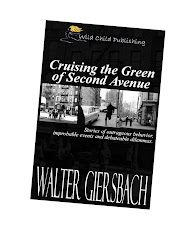We know [below] that POD titles are increasing and traditional print is dropping.
So, what makes POD attractive? Cover prices that are reduced. Royalties that accrue to the author in greater amounts. And, wider distribution through “long-tail” marketing. (A single outlet, like Amazon, carries hundreds of thousands of books, while a mass retailer is limited by store size.)
The "economic winter" that leaves traditional publishers shivering means they've virtually eliminated marketing and promotion for all except major (i.e., money-making) authors. At the same time, publishers continue to hold sacred the Depression-era practice of accepting the return of any book that the retailer cannot sell. This strange marketing practice began as a way to ensure that retailers would continue to stock new titles. In 2005, the Association of American Publishers reports that of the 1.5 billion books shipped, 455 million were returned to publishers — 31 percent! — at the publishers’ expense.
Would General Electric ever consider shipping refrigerators to Wal-Mart under these consignment conditions? Or Ford Motors to its independent dealers?
Publishers are scrambling to meet the new paradigm by discounting, spiffing (Sales Performance Incentive Fund) the big box outlets, and flirting with new techniques. Textbook publishers are raising prices to outrageous heights while introducing CD workbooks on three-year revision cycles to reduce the effect of students reselling their old texts. Price cards, like Borders or Barnes & Noble “memberships,” are resulting in a barrage of e-mail solicitations and discounting. And prices continue to rise, with e-books often marketed at over 80% of the hardcover price.
Pricing is the new battlefield. In October 2010, I searched Barnes & Noble for Special Projects in Calamity Physics by Marisha Plessl. This 2006 novel had been an immediate bestseller. Now, Amazon is discounting the trade paperback down from $15.00 to $10.50, while offering a Kindle download for $12.99. Barnes & Noble listed the trade paper at $10.80 and the e-book at $12.99.
Take a deep breath and think about it. It doesn’t take a wizard to know something’s wrong when the price of a digital product approaches or exceeds the cost of a formatted, typeset, printed, bound and shipped version that is subject to returns.
Wednesday, February 23, 2011
Thursday, February 17, 2011
Dipping another Toe into the Rapids
Borders has declared chapter 11 bankruptcy, allegedly because e-books are stealing their cake. More than a quarter million books were published last year, but I betcha one third go back to the publishers to be pulped. In fact, the number of POD (print on demand) titles published in the U.S. increased 200 percent in 2008. In the same period, the publication of traditional titles dropped 3 percent to 275,232. And –zowee! – this week’s New York Times Book Review bestseller list has been expanded to include e-book sales.
Events are moving so fast that my head spins. Scrolling through my Palm Tungsten makes me feel like a caveman making fire with two sticks while my kids are equipped, figuratively, with Zippos. Should I buy an iPhone with a GPS app, Web access and tinny little iTunes? I rarely call people, so the telephone aspect is irrelevant, but then, younger people eschew e-mail in favor of texting. And I cherish my CDs of Billie Holiday and Chet Baker.
But maybe I can adapt slowly, the way dinosaurs turned into birds. Our WPIX-TV commentator said last night that everything is devolving onto the Internet – and now someone in Congress wants to give the President unilateral control to shut down the ‘net if there’s an emergency.
Wordsmith, author and webmaster Jon Gibbs [http://www.acatofninetales.com/] talked with our writers’ group Tuesday, and we were all enthralled with his explanation of how book marketing works (and what doesn’t work), social networking as a merchandising tool, and technological proficiency as a must-have for any writer. There went my head spinning again, and I thought I was successfully tracking developments in the publishing world.
Perhaps if I just pick at the new, digital world, the way I ate my mother’s cauliflower, I’ll see what works and what doesn’t. And I won’t need to throw away my Palm PDA just yet. Or eat cauliflower.
Events are moving so fast that my head spins. Scrolling through my Palm Tungsten makes me feel like a caveman making fire with two sticks while my kids are equipped, figuratively, with Zippos. Should I buy an iPhone with a GPS app, Web access and tinny little iTunes? I rarely call people, so the telephone aspect is irrelevant, but then, younger people eschew e-mail in favor of texting. And I cherish my CDs of Billie Holiday and Chet Baker.
But maybe I can adapt slowly, the way dinosaurs turned into birds. Our WPIX-TV commentator said last night that everything is devolving onto the Internet – and now someone in Congress wants to give the President unilateral control to shut down the ‘net if there’s an emergency.
Wordsmith, author and webmaster Jon Gibbs [http://www.acatofninetales.com/] talked with our writers’ group Tuesday, and we were all enthralled with his explanation of how book marketing works (and what doesn’t work), social networking as a merchandising tool, and technological proficiency as a must-have for any writer. There went my head spinning again, and I thought I was successfully tracking developments in the publishing world.
Perhaps if I just pick at the new, digital world, the way I ate my mother’s cauliflower, I’ll see what works and what doesn’t. And I won’t need to throw away my Palm PDA just yet. Or eat cauliflower.
Subscribe to:
Posts (Atom)


